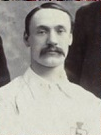Who was Blackburn Rovers’ greatest goalscorer? Was it Shearer, Sutton, Tommy Briggs, Simon Garner, or present day poacher, Jordan Rhodes?
Believe it or not, one former player, actually born and bred in Blackburn, is up there with the best of them when it comes to his record of scoring goals for Rovers. His strike rate is even higher than Alan Shearer’s!
Jack Southworth was born on Ainsworth Street in 1866 and baptised in what became Blackburn Cathedral. He came from a musical family and would go on to become a professional musician when his football career was ended by injury.
His brother Jim, also a musician, played alongside his sibling for Rovers. Both of them started playing with Rovers’ town rivals, Blackburn Olympic. But after earlier rejections, they were eventually lured across Corporation Park from Shear Brow to Leamington Road.
Jack quickly became a favourite with the Rovers fans, who nicknamed him ‘Skimmy’, due to his speed. He became a deadly striker, dubbed the ‘Prince of Dribblers’ and was popping them in at an important time in our history.
We become founder members of the Football League in 1888. Next came our move to Ewood Park. There was also a small matter of Rovers winning two FA Cups in 1890 & 1891. The first of these while still playing at Leamington Road and our next after the move to our current home. Jack scored in both victories. He also played three times for England, inevitably scoring in all three games.
Although we are taking about those early days of organised football, Southworth’s goals record is still incredible. He played 132 Football League and FA Cup matches for Rovers, scoring 121 goals. He scored Rovers’ first ever goal in the Football League and he still holds Blackburn Rovers’ record for the most individual hat-tricks in a season, with five in 1890–91, and the record for the aggregate individual hat-tricks with thirteen.
Sadly, Skimmy and the Rovers fell out over football’s perennial curse – money. Although Southworth had a good point in his argument about wishing to move to Everton to further his musical career. The Toffees had just moved into their new Goodison Park ground and were splashing the cash. They paid Rovers £400 and took away our first prolific goal scorer – no doubt some former fans of the then recently defunct ‘Lympic would have had a laugh at their fellow townsfolk’s loss.
The real reason for his transfer was Rovers’ developing financial problems due to the Ewood Park move and joining the Football League. But Jack was still pilloried by the local press and Rovers fans for jumping ship. At least he was given his say in a letter which they published. He explained his reasons candidly, for both financially and musically, wanting away. The latter was obviously his first love. Even at the height of his powers at Rovers, the 1891 census has him living in Inkerman Street and his occupation listed as a musician.
At Everton he was a sensation in his first season, scoring 27 goals in 22 games. It looked more of the same in his second season, with nine goals in as many games. But then he was struck by a leg injury which ended his football career. Fortunately, he had other strings to his bow in more ways than one and became a professional violinist with the Halle Orchestra. He went on to play different instruments in various famous orchestras across the north for several years.
Jack Southworth died in in Liverpool in 1956. He was nearly 90. He may not have been Rovers’ greatest striker, but he was certainly our most artistic.


JACK OPENS HIS MOUTH AT LAST
John Southworth, the ex-Rover writes to us as follows:-“Sir,—Now that my connection with the Rovers’ Football Club is at an end, and I am in a position of greater freedom and less responsibility, so far as the committee are concerned, I trust you will grant me space in your valuable paper for this communication. From week to week lately your columns have contained statements in reference to my conduct and attitude towards the committee, and imputing to me the most mercenary and unsportsmanlike conduct in my negotiations with the committee, and which are calculated very seriously to prejudice me in the eyes of the public if allowed to go unchallenged. First of all, I may state that in trying to sever my connection with the Rovers I have only had one object in view, to try and assure myself of a position after my football days are over, which a place like Liverpool affords for a musician, more so than Blackburn. From my first appearance in the Rovers to the end of last season I have played in the position of centre-forward. In 1887-8 I had £1 a week for the playing season, and the same in 1888-9, thus for two years I got about £70. These terms held good also for the season 1889-90, but a bonus of £20 was added, which makes about £55. The following season, 1890-1, I was paid £2 a week for the playing season and £10s. a week for close season, making a total for this season of £78 10s. In 1891-2 I signed for two years, which meant till the end of 1892-3, for £2 a week playing season, 10s. a week close season, and £100 bonus, but instead of receiving the £100 down I got it in instalments, the last of which I got after the finish of last season. I also had a benefit match which realised between £70 and £80, but this not being included in my wages I don’t put it down on my wage list. Thus in six years, I have cost the Rovers in weekly wages and bonuses about £460 10s. Now for the other side of the question. With these facts before them the public will be able to judge as to the sneers which have been indulged in, in reference to a very costly player. If I had been the selfish, grasping, mercenary character I have been represented to be, utterly regardless of anybody or anything but my own pocket, I could, four years ago, have had £2 10s. a week all the year round from Everton, with a prospect of £3 a week or even more the following year, and since that offer I have refused one from Sheffield United two years ago (in fact only a few days before I signed for the Rovers for two seasons) of £4 a week all the year around, and a bonus of £50, and assuming I played another season with them at the above salary (£4 a week) without the bonus it would bring up my wage list to considerably over £700 for four years as against £460 in wages from the Rovers for six years. It would be interesting to know how many of those who are so bitter on the subject would have refused these tempting offers. In breaking off the agreement arrived at between the committee and myself I wish to state that it was not my fault. The sub-committee appointed to treat with me, and supposed to have full powers, agreed without any reservation whatever to terms, including my release, if desired, at the end of the season for not more than £20, but their full committee repudiated the agreement of their sub-committee, hence my transfer.” – Blackburn Standard, 9 September 1893